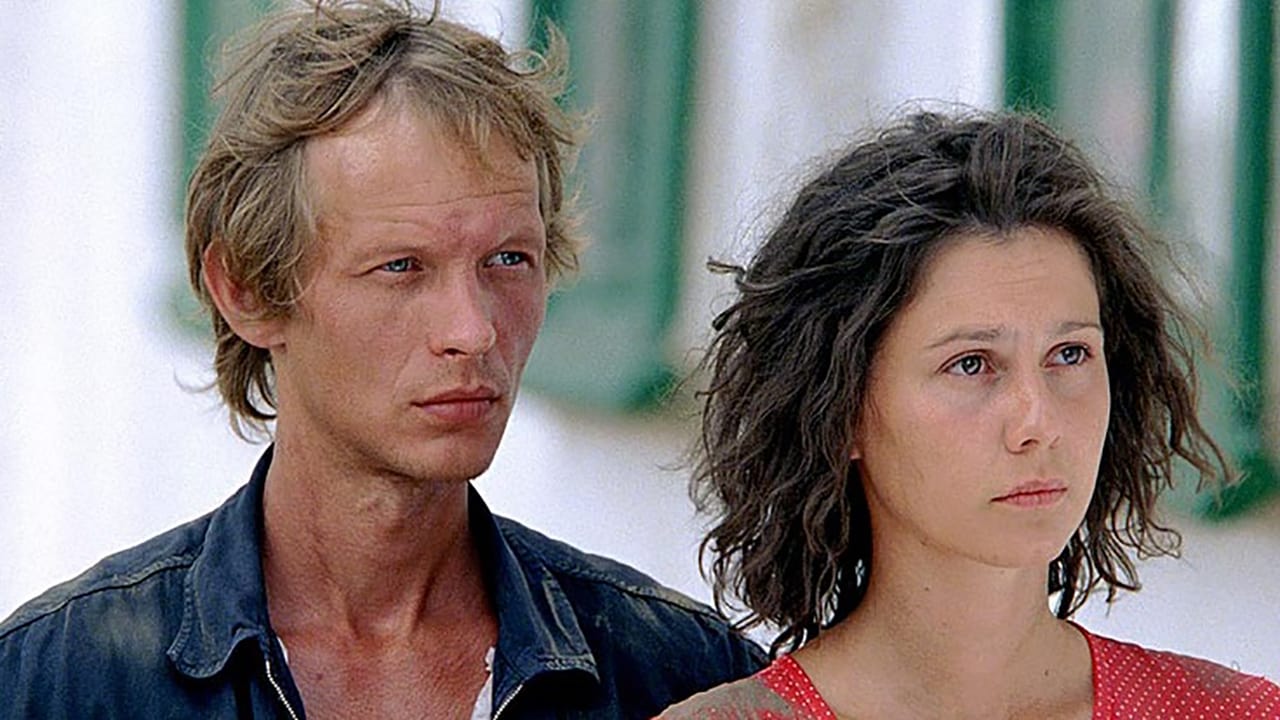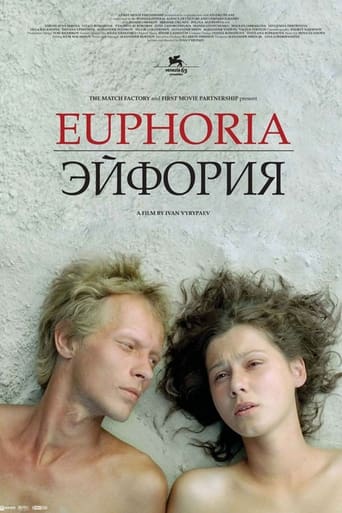

Best movie of this year hands down!
... View MoreExcellent, smart action film.
... View MoreJust intense enough to provide a much-needed diversion, just lightweight enough to make you forget about it soon after it’s over. It’s not exactly “good,” per se, but it does what it sets out to do in terms of putting us on edge, which makes it … successful?
... View MoreThe film may be flawed, but its message is not.
... View MoreI have seen very little of the Russian cinema made in the years since the Soviet Union does not exist, and for me it's kind of a discovery similar to seeing new cinema schools from unknown places. Yet, Russian cinema is also the successor of an important film school, with major directors and an film industry that was part of the propaganda machine during Communist rule, but also succeeded to make major films and launched important directors.'Eyforiya' is a beautiful and unusual film. It is a love story set in the Russian steppes, in a place where civilization seems to be in retreat. Primary instincts and dreams seem to rule the actions of the characters. The story of the forbidden love of the farmer's wife and of the goat-keeper who sees and falls for her at a wedding party is doomed to end in tragedy, not only for them but for almost everybody around, yet none of the characters seems to be in control of his life or actions. As the fool at the beginning and end of the film who is stuck by the mob to his motorcycle and starts to run wildly to nowhere, so do the characters seem to be under the control of a destiny that is hostile to them for reasons unknown. Nature plays the lead role in the film, with a landscape suggesting desolation, infinity, with forces that dwarf human will, and with a balance and harmony that seem to broke at the moment the couple makes an attempt to fulfill some kind of personal happiness. All is beautifully filmed, colors and composition are beautiful by themselves and they become part of the experience of seeing this film. At scarcely 70 minutes of screening the film is the right size for us to accept and feel this beauty before the simplicity of the story becoming too evident to bother. Beautiful poems are never too long.
... View More"Euphoria" is definitely a mix of two directing styles - theatrical and cinematographic. Or you might say two outlooks on life, two points of view on the world. And this mix is extremely rare and thus so extremely thoughtful and pleasant... Each sequence in the movie somehow reminds us of the theater stage - sometimes this stage is physically limited by some objects (posts, walls, buildings) or totally unlimited with endless plains and sky serving as the theater scenery. And sometimes what we see on the screen looks just like some photos or pictures, still art... But despite this movie's advantages from the professional point of view the best part of it is the emotional impact it's creating and definitely the ideas it's delivering. Actually, the whole movie's main idea is summarized by the director Vyripaev himself (who is in fact theater director, actor and playwright) in the first several minutes or even seconds of the film. I'm talking about the 'Disabled-guy- riding-a-bike' scene. It is some kind of the metaphor or allegory expressing director's look at the life itself. That intellectually challenged person is - who would you think? - the personification of any human in general. Just like him we don't have any idea who (or Who) put us on that bike (equal life) and what for. Just like him we can't figure out at first what we are doing in here and where are we heading to. We're confused but keep on moving because it's harder to get off that bike than staying on it. That's why we keep on looking ahead curious - what's going to happen. Later something terribly wonderful happens and we start loving that ride despite the fact that we've already turned away from the road. We start feeling filled with life - that's what is called Euphoria. We are still confused...but happy! Because we just don't care where is the right road and that we've already in the open steppe, plains. We keep on riding, "changing lanes", crossing somebody's lives flowing in the stream of the "mystic river" of the life, looking at the "vanilla sky" of this world...and having good time. This is Euphoria. Through this scene, and actually through the main plot, and through the side plots Vyripaev shows what such a fullness of life and love can lead to - death, happiness, sorrow, birth... Euphoria overall!
... View More"Eyforiya" is a very expressive film from cinematographic point of view.With its simple story and strategic composition of image and sound it reminds me of Sokurov's debut feature film "Lonely man's voice(Odinokiy golos cheloveka)". As Sokurov's film, here we notice poetic composition based on associations and "ostranenie"(enstrangement)of ordinary life. Also one can say about symbolic use of Elements of Nature(Sun,Water,Clouds)which can be observed in such Russian art films as "The Mirror(Zerkalo)" and "Return(Vozvrashcheniye)"But here the total absence of religious motives and exposure of cultural and material poverty of Russian provincial village made it unique. We feel shocked by abrupt changes of different modes:from poetic one to ordinary,even banal one. Or the reverse movement. And this gap is even emphasized by music.I think, in this ironic play with two contrary different modes is the director's original contribution to Russian poetic school.
... View MoreAs the name of the film implies, it is very poetic. There is hardly any plot, instead, it is carried by the major characters' emotions, manifesting themselves in depictions of a beautiful landscape largely untouched by civilisation and the film's music, which is at the same time sublime and calming.Slowly, yet inevitably, outward reality is permeated by the characters' inner sensations, the secluded landscape devoid of human presence metaphorically representing the characters' constant and persistent departure from reality into an inner unreal and irrational world where feelings and emotions are substituted for reason, the regulating force of the rational world, abandoned by the protagonists.Yet the calming removal from outward reality turns out to be just momentary and illusive. Reality, allegorised by the female protagonist's deceived husband, stalks its prey, eager to destroy the fleeting quietude of the unstable and unreal metaphorical space.Unfortunately, being rather a rational than poetic person, I cannot help but to additionally interpret the film in a rational way. Interpreted in rational terms, there is a major flaw at the core of the film. In order to avoid any spoilers, it will suffice to say that the female character's child as well as male protagonists have to suffer for the woman's adultery.This is a very misogynous perception, which used to be typical for the pre-1960s society. Prior to the feminist movement in the 1960s onward, patriarchal societies around the globe aimed at presenting the world in male terms, reducing women to mere objects who have to obey and to behave in accord with the patriarchal norms and regulations. Obviously, this perception neglects female desires and aspirations, which have to be sacrificed in order to maintain the patriarchal status quo.Thus, an incredible amount of films was produced prior to 1960s, whose aim it was to present the alleged horrendous consequences of female behaviour that deviated from the norms as set by patriarchal society. In most cases, already a mere consideration of abandoning the husband sufficed to cause havoc in the family, damaging the children and husband alike. I have not, however, seen any recent films communicating this flawed, archaic, and anti-feminist message, and, therefore, hoped that this kind of anti-feminist films has gone for good.Unfortunately, this film has proved me wrong. The female protagonist appears insecure, unable to make decisions for herself and to abandon her family to start her life anew. Instead, she is persistently dragged away by her lover, eventually resigning to her fate. At a closer look her lover appears as an alter ego of her husband, yet another representative of the male society, eager to protect and to own the female, without making any attempts at understanding the female nature.At one point in the film one of the protagonists says, "Don't think. Contemplation just makes things worse." This may be a guideline to watching this film - don't think about it. Let yourself be carried away by its poetic qualities. Don't try to interpret the film in rational terms, it was not meant to be interpreted in such a way by the director. A rational interpretation would violate the film's poetic nature and inevitably ruin the experience
... View More